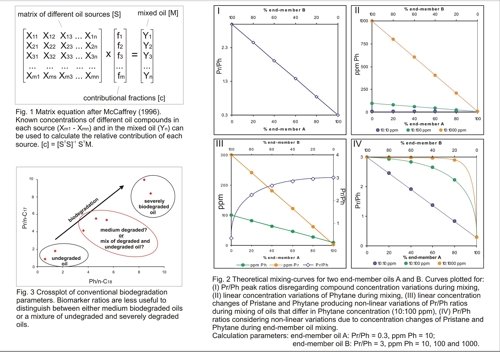Improved Assessment of Fluid Mixing in Petroleum Systems
Fluid mixing is increasingly recognised as a key control on petroleum composition, property and quality, since “essentially all petroleums are mixtures” according to A. Wilhelms and S. Larter (2004). Despite this, adequate tools for the qualitative and quantitative assessment of mixing which are equally practical and reliable are still lacking. Fluid mixing can occur in different places and during different stages of petroleum generation. Oils produced by separated source rocks can mix during migration in the carrier or later within the reservoir rock. Petroleum which is expelled at different (geological) times from the same source showing varying thermal maturity can accumulate in the same reservoir. Additionally, migration contamination in the carrier may be a further mechanism of petroleum mixing. Mixing will have crucial but so far widely overlooked effects on geochemical tools conventionally used in petroleum system evaluation such as oil-oil- and oil-source-correlation or maturity assessment. It is not known to which extent mixing plays a role in formation of compositional gradients within reservoirs. Most currently used approaches for mixing assessment introduce methodological biases which may restrict their application to very specific cases.
In this project we will apply a comprehensive petroleum geochemical approach to develop new methods that allow to assess whether an oil represents a mixture or not and to quantitatively deconvolute the contributions of mixing petroleums to different component fractions of reservoired fluids. Inconsistencies in petroleum composition considering different component fractions or different compounds of the same fraction of the oil which may have been contributed from the mixing petroleums to a different extent are the main criterion to identify mixed oils. Specific attention will be given to the use of compound specific isotope signatures which in mixed petroleums depend on three independent variables and thus represent an especially promising tool for the assessment of mixing. The ultimate goal of this project is the development of a validated approach for the assessment of petroleum mixing in routine industrial application.
Literature
Wilhelms, A., Larter, S., 2004. Shaken but not always stirred. Impact of petroleum charge mixing on reservoir geochemistry. In: Cubitt, J. M.; England, W.A.; Larter, S. R. (eds.), Understanding Petroleum Reservoirs: Towards an Integrated Reservoir Engineering and Geochemical Approach. London, Geological Society, Special Publications, 237, 27-35.
Participants
- Dr. Stefanie Pötz
- Prof. Heinz Wilkes
- Dr. Andrea Vieth-Hillebrand
Funding
- Industrie


